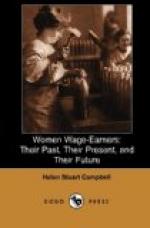In the region between Houston Street and Canal Street, known now to be the most thickly populated portion of the inhabited globe, every house is a factory; that is, some form of manufacture is going on in every room. The average family of five adds to itself from two to ten more, often a sewing-machine to each person; and from six or seven in the morning till far into the night work goes on,—usually the manufacture of clothing. Here contagious diseases pass from one to another. Here babies are born and babies die, the work never pausing save for death and hardly for that. In one of these homes Dr. Daniel found a family of five making cigars, the mother included. “Two of the children were ill of diphtheria. Both parents attended to these children; they would syringe the nose of each child, and without washing their hands return to their cigars. We have repeatedly observed the same thing when the work was manufacturing clothing and undergarments to be bought as well by the rich as by the poor. Hand-sewed shoes, made for a fashionable Broadway shoe-store, were sewed at home by a man in whose family were three children sick with scarlet-fever. And such instances are common. Only death or lack of work closes tenement-house manufactories ... When we consider that stopping this work means no food and no roof over their heads, the fact that the disease may be carried by their work cannot be expected to impress the people.”
Farther on in the report, she adds: “The people can neither be moral nor healthy until they have decent homes.” Yet the present wage-rate makes decent homes impossible; and though Brooklyn and Boston have a few model tenement-houses, New York has none, the experiment of making over in part a few old ones hardly counting save in intention. Into these homes respectable, ambitious, hard-working girls and women are compelled to go. That they live decent lives speaks worlds for the intrinsic goodness and purity of nature which in the midst of conditions intolerable to every sense still preserves these characteristics. That they must live in such surroundings is one of the deepest disgraces of civilization.
As to wages, concerning which there seems to be a general opinion that steady rise has gone on, we find Dr. Daniel giving the rates for many years. She writes:—




